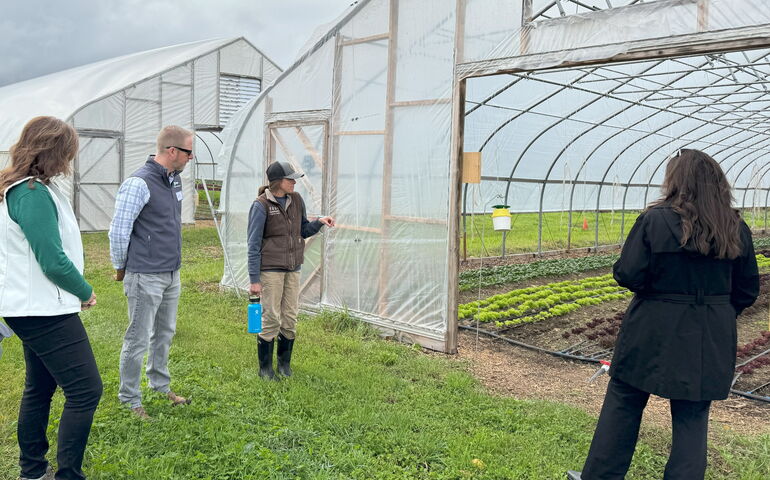A grant program to help Maine farms respond to climate change is being paired with an online tool that assesses how climate may affect individual agribusinesses.
Maine Farmland Trust announced the two programs last week. Grants of $5,000 have already been awarded to 19 farms across the state.
“The reality that climatic weather patterns are changing is just another daunting challenge farms must face and adapt to in the coming years,” said Bethany Allen and Eric Ferguson of Harvest Tide Organics, an organic farm in Bowdoinham.
“For our operation, continued investment in irrigation capacity and reliability is paramount to overcoming many of the challenges of a shifting climate and unreliable precipitation patterns.”
Allen and Ferguson said they plan to use their grant to install buried water lines, frost-free hydrants and a mobile pumping station.
Maine Farmland Trust, with offices in Belfast and Portland, is a statewide, member-powered nonprofit working to protect farmland, support farmers and advance the future for farming.
Since its founding in 1999, the trust has permanently protected over 370 farms and has helped to keep over 68,000 acres of farmland in farming and support a network of over 550 farms with critical services.
Mapping tool
The trust’s new Climate Impact Assessment Mapping Tool is an interactive resource that identifies climate risks and potential severity of the impact to specific properties, helping farmers plan for their farm’s future or compare prospective properties.
Using geospatial information, climate science and geological data, the tool generates a risk assessment report that shows current water availability, floodplain risk, projected changes in temperature and precipitation, projected sea level rise and projected risk of soil erosion.
Based on those factors, the property receives a weighted overall score to indicate to what degree the farm might be affected by climate change.
The tool is part of the trust’s new climate resilience program, which helps farmers plan and implement new practices, infrastructure and landscaping to become more resilient to the effects of climate fluctuation.
“Farmers’ livelihoods, our food security and our economy depend on resilient farms that can minimize and more easily bounce back from the effects of a changing climate,” said Tricia Rouleau, who oversees the program as the trust’s farm network director.
“There’s a lot of appetite from Maine farmers to adopt climate resilient strategies, but planning and implementation take time and resources, and there’s no one-size-fits-all solution.”
The program is designed to support farmers with a variety of needs and goals, offering risk assessment tools, financial resources, and planning and technical assistance tailored to each farm.
The growth of the climate resilience program was accelerated by a $1 million, three-year grant awarded by TD Bank Group through the 2022 TD Ready Challenge. It aims to give $775 million in total by 2030 in areas such as financial security and and better health.
“TD is thrilled to support Maine Farmland Trust as they work toward securing our future food supply by strengthening the infrastructure and climate resiliency of our farms in New England,” said Sheryl McQuade, regional president for TD’s New England metropolitan area.
The trust developed the mapping tool with support from TD and from the Land Trust Alliance and Open Space Institute’s Land and Climate Grant Program.
Climate resilience grants
The trust said its awards of $5,000 each to 19 farms across the state spans eight counties and represents diverse farm operations, including dairy, vegetable, berry and fruit producers.
The grant program is open to the trust’s network of over 550 farms. The flexible, one-time grants are awarded to help easement-protected farms or farms engaged in the trusts’ other programs to respond to current climate-related problems and increase future resilience.
“Whether it’s flooded fields or dry wells leading to crop loss and delayed harvests, farmers are already experiencing the impacts of climate change,” said Rouleau.
As a result of record rainfall and severe storms this past year, many farms are leveraging the funds to improve drainage systems or invest in high tunnel infrastructure where growing conditions can be more easily controlled.
Other farms are responding to three consecutive summers of drought with plans to install or upgrade water lines, wells and pumps; purchase drought-tolerant seeds; and add shade cloth. Another round of climate resilience grants will open later in 2024.
Upcoming climate programs
The trust said it would continue to grow its climate resilience programs to reach more farmers beyond its network.
Later this year, Maine farmers will have an opportunity to apply for the organization’s climate adaptation planning program, a three-month to six-month program providing individualized support to assess their farm’s climate risks, identify strategies to grow their farm’s resilience, set goals, and navigate funding resources, including a $5,000 grant opportunity from the trust.
The program grew out of the Maine Soil Health Network, a pilot program between the trust and Wolfe’s Neck Center for Agriculture & Environment in Freeport, which launched in 2021 in partnership with Pasa Sustainable Agriculture, a Pennsylvania sustainable agriculture nonprofit.
Fourteen farms participating in the Maine Soil Health Network have completed or are developing climate resilience plans with a focus on soil health.
Through another program in development, the trust said it would work with Maine farmers interested in adopting select National Resources Conservation Service climate-smart practices with financial resources, data collection and evaluation, knowledge-sharing, and marketing support, funded by a $55 million U.S. Department of Agriculture award.
